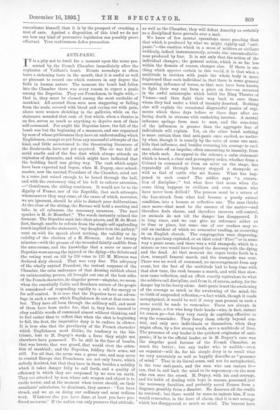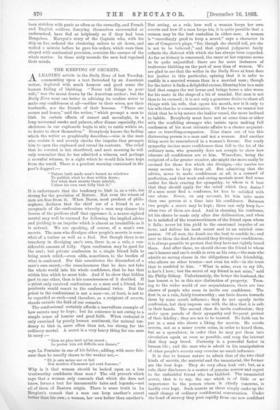ANTI-PANIC.
IT is a pity not to dwell for a moment upon the scene pre- sented by. the French Chamber immediately after the explosion of Vaillant's bomb. Events nowadays so often leave a sickening taste in the mouth, that it is useful as well as pleasant to record one which restores in any degree the -faith in human nature. The moment the bomb had fallen into the Chamber there was every reason to expect a panic among the Deputies. They are Frenchmen, to begin with,— that is, they must be classed among the most excitable of mankind. All around them were men staggering or falling from the seats, covered with blood and crying out with pain, above were women shrieking in the galleries, while on the staircases sounded that rush of feet which, when a theatre is on fire, serves as much as anything to deprive men of their ,self-command. For aught the Deputies knew, the fall of the bomb was but the beginning of a massacre, and one organised by men of whose pitilessness they have an understanding which Englishmen, exempt as yet from any successful attempts of the kind, and little accustomed to the threatening literature of the Boulevards, have not yet acquired. The air was full of acrid smells and of the fine dust which always attends an .explosion of dynamite, and which might have indicated that the building itself was giving way. The rush which might have been expected had begun, when M. Dupuy, once school- master, now the untried President of the Chamber, cried out in a voice just raised enough to be heard through the hall, and with the customary ring of his bell to enforce attention, —" Gentlemen, the sitting continues. It would not be to the .dignity of France, nor of the Republic, that such attempts, whencesoever they may come, of the cause of which, moreover, we are ignorant, should be able to disturb your deliberations. At the close of the sitting, the Bureau will hold a meeting and take, in all calmness, the necessary measures. The next speaker is M. de Montfort." The words instantly calmed the ferment. The Deputies sank into their places, and M. de Mont- fort, though unable to refrain from the single self-applauding touch implied in the statement, "my daughter is in the gallery," went on with his speech about nothing, the validity or in- validity of the election of a M. Mirman. And for twenty minutes—with the groans of the wounded faintly audible from the ante-rooms, and the knowledge that a score or more of Deputies were among the injured or the dying—the debate and the voting went on till by 326 votes to 123 M. Mirman was declared duly elected. That was very fine. The adequacy -of the wholly untried President, the instant response of the Chamber, the calm endurance of that droning rubbish about an uninteresting person, all brought out one of the best sides of the French character, its singular power—singular, we mean, when the essentially Celtic and Southern nature of the people is considered—of responding rapidly to a call for energy or for self-control. It is true that the Deputies have an advan- tage in such a scene, which Englishmen do not at first remem- ber. They have all been through the military mill, and most of them have been under fire, that is, they have learned to obey audible words of command almost without thinking, and to feel rather than to reflect that when the shot is beginning to fall, the first, the imperative duty is to endure in silence. It is true also that the peculiarity of the French character which Englishmen most dislike, its tendency to the his- trionic, lent to M. Dupuy's words a force they might not elsewhere have possessed. To be still in the face of bombs, that was heroic, that was grand, that would rivet the atten- tion of mankind ; and the Deputies, folding their arms, sat still. For all that, the scene was a great 'one, and may serve to remind Europe that Frenchmen are not only brave, which nobody doubted, but that they have in them besides a nobility which it takes danger fully to call forth, and a quality of .efficiency in which they are surpassed by no race on earth. They are attacked by men whose sole weapon and object is to excite terror, and at the moment when terror should, on their assailants' calculation, be dominant, they answer : ' You have struck, and we go on doing our ordinary and most tedious work. Whatever else you have done, at least you have pro- duced no terror.' If the nation can only preserve that attitude, as well as the Chamber, they will defeat Anarchy as certainly as a disciplined force prevails over a mob.
We know of few mental operations more puzzling than that which is produced by what we might rightly call " anti- panic,"—the emotion which in a mass of soldiers or civilians suddenly, indeed instantaneously, arrests the uncontrollable- nese produced by fear. It is not only that the action of the individual changes ; the general action, which is so far less within the domain of reason, changes also. If there is one thing which appears certain in this world, it is that when a multitude is stricken with panic the whole body is more frightened than each individual is, that there is some general emanating influence of terror, so that men have been known to fight their way out from a place on fire—as occurred in the awful catastrophe which befell the Ring Theatre of Vienna—and then fight their way back' to save those whom they had under a kind of insanity deserted. Nothing else will explain the occasional disgraceful panics of regi- ments which three days before or three days after are facing death in streams with unshaking heroism. A mental influence springs from man to man, and the sum-total of the influences is greater than the aggregate fear of individuals will explain. Yet, on the other hand, nothing is more certain than that anti-panic once excited, no matter by what, though it is usually by the voice of some one man, kills that influence, and besides restoring his courage to each man, clears off an impulse, often amounting to insanity, from the whole mob. An appeal to the colours, a calm statement which is heard, a clear and peremptory order, whether from a Colonel in command or from an actor on the stage, has repeatedly all through history stopped a stampede as wild as that of cattle who see flames. What has hap- pened in such cases P The soldier says "a restora- tion of discipline ; " but what does that mean when the same thing happens to civilians and even women who have never been drilled ? The process must be a return of the fear-struck from what had become a purely animal condition, into a human or reflective one. The man thinks once more—that must be the essence of the matter—and therefore feels shame, and therefore recovers self-control, as animals do not till the danger has disappeared. It is long since, and we can give no reference either as to time or place, but some one of our readers may re- call an incident of which we remember reading, as occurring in an English church. The congregation were dispersing, when a gas-lamp exploded, or an idiot cried "Fire!" or in souse way a panic arose, and there was a wild stampede, which in a minute or two would have heaped the doorway with the dying and the dead. At that moment the organ broke forth in a slow, tranquil funeral march, and the stampede was over. There was no word of command, no encouragement from any event, but the feet of the multitude had to keep time with that slow tune, the rush became a march, and with that slow- nese came reflection, and an effect exactly equivalent to what the soldiers call discipline, and from it, of course, safety, for the danger lay in the burry alone. Anti-panic is not the awakening of the courage so much as the awakening of the mind, the re-birth of suspended reflection,—a fact which, though it reads metaphysical, it would be well if every man present in such a scene could be made to remember. There are always, in every panic, a few who keep their heads—who, in fact, cannot let reason go—but they very rarely do anything effective to stop the remainder. They fancy them utterly beyond eon- trol, and only save individuals or themselves, when they might often, by a few strong words, save a multitude of lives. The presence of any leader is the quickest originator of anti- panio ; if he is the official leader, as in M. Dupuy's case was the singular good fortune of the French Chamber, so much tbe better ; but any leader who is audible—even an organist—will do, for his simple duty is to recall what we very accurately as well as happily describe as "presence of mind." That in its literal sense, and not its metaphorical, is the true anti-panic, and the man who can restore it can, that is, call back the mind to its supremacy—is the man who can save the crowd. M. Dupuy, with his cool courage, and his habit of dealing with boys in masses, possessed just the necessary faculties, and probably saved France from a disgrace, possibly from a disaster. He deserves all the credit he received ; but there would be more to imitate him, if men would remember, in the hour of alarm, that it is not courage which has disappeared so much as mind. The bravest have been stricken with panic as often as the cowardly, and French and English soldiers, fancying themselves surrounded or undermined, have fled as helplessly as if they had been Bengalees. Marryat's story of the Captain who, with his ship on fire, ordered the clustering sailors to sit down, and waited a minute before he gave his orders, which were then obeyed with mechanical precision, contains the essence of the whole matter. In those sixty seconds the men had regained their minds.











































 Previous page
Previous page